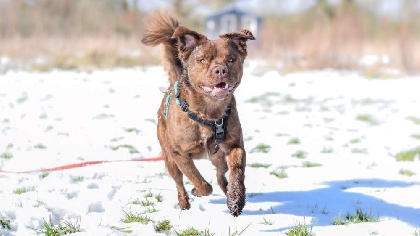
As temperatures drop and winter weather sets in, Dogs Trust Manchester is urging pet owners across the country to take extra care in protecting their furry friends from the hidden dangers of antifreeze.
Commonly used in de-icing products, screen wash and in car engines, antifreeze contains ethylene glycol, a highly toxic substance that can cause severe illness or even death in pets if ingested. Even a very small amount can be deadly.
Antifreeze has a sweet taste, which can make it tempting for animals to drink if it’s left in accessible areas or spills onto driveways and roads. Unfortunately, the ethylene glycol it contains can cause acute, irreversible kidney failure and neurological issues. Symptoms of poisoning may not appear immediately, but early signs to watch for include:
- Vomiting
- Lethargy and weakness
- Unsteady or drunken-like behaviour
- Increased thirst and urination
- Rapid breathing
- Seizures or muscle twitching
If you suspect your pet has ingested antifreeze, contact a vet immediately. Prompt treatment is critical to prevent irreversible damage and, if left untreated, ingestion of antifreeze can lead to kidney failure, coma, and death. The faster treatment begins, the better the chances for a full recovery.
Charlie Dobson, Senior Veterinary Surgeon at Dogs Trust, said: “Antifreeze is extremely dangerous for dogs, and other pets, because even a small amount can lead to serious, often fatal, health issues. Unfortunately, because it has a sweet taste it can be particularly enticing to pets.
“The best way to protect your dog is to keep all antifreeze and de-icing products securely stored, avoid using them around your dog, and seek veterinary care immediately if you suspect they’ve ingested any.”
Keeping Your Pets Safe
Antifreeze is not the only risk facing dogs and their owners in this weather. To help ensure dogs remain healthy and happy, the nation’s largest dog welfare charity has published some easy-to-follow guidance.
- Stay warm - Dogs feel the cold just like we do, so it is important to keep them warm. Some breeds grow thick furry coats all year round, so, as the weather gets colder, consider letting your dog's fur grow longer to give them added protection. Some shorter-haired pooches and puppies may need a little bit of help staying warm, so consider buying them a sensible winter coat. Wearing a coat is a new experience for some dogs and needs to be introduced in a gradual and positive way.
- Keep your dog on the lead - Snow can be disorientating for dogs, and they can become easily lost in it. Make sure your dog is wearing a collar and ID tag, and their microchip details are up to date.
- Wipe after walking - Make sure you wipe your dog’s legs, feet and stomach after a walk, as grit from the roads and dampness from rain or snow can irritate their skin.
- Avoid ice – Many dogs love to swim but with these freezing temperatures, they may find their usual spot frozen over. While it might be tempting to let them run on this ice, Dogs Trust is warning that this could be dangerous for both dogs and owners alike. The ice may not be thick enough to take your dog’s weight, and they could fall through into the freezing water underneath.
- Increase visibility - Your own safety is important too. Before heading out for a walk, make sure that you are dressed appropriately for the weather with a suitable coat and shoes, and ensure you and your dog are visible. As the days grow shorter, consider wearing a high-vis jacket, and use a reflective collar, lead, and high visibility coat for your dog.
- Check your lead - Regularly check your dog's leads, collars and harnesses to make sure they’re all functioning safely and won’t get damaged by winter weather, as wet weather can cause metal clips to rust. It can be trickier to do up lead clips and attach them to collars and harnesses when it's cold, so do this indoors if you can.
- Consider indoor games - You might be spending more time indoors if the weather's very bad, so always make sure your dog has plenty to do. Indoor games like hide and seek, or 'find it', are fun and mentally stimulating for your dog. Hide a toy for them to search for and play with them as a reward when they find it. Long-lasting tasty chews, or rubber food-releasing toys and enrichment games are useful for giving your dog something enjoyable to do that is mentally stimulating.


 Angela Rayner suspended from Unite amid Birmingham bin strike controversy
Angela Rayner suspended from Unite amid Birmingham bin strike controversy
 Vision of change for Stalybridge takes another step forward
Vision of change for Stalybridge takes another step forward
 Senior member of Tameside Council to shift to Warrington
Senior member of Tameside Council to shift to Warrington
 Tameside Council announces £1.5 million SEND investment
Tameside Council announces £1.5 million SEND investment



